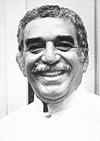
Gabriel García Márquez
 |
|
Gabriel García Márquez |
Comparing Colombia's current
bloody, multi-sided civil war with La Violencia, the deadly upheaval that
wracked the country in the 1940s and 1950s, García Márquez noted that last
Gabriel García Márquez Comparing Colombia's current
bloody, multi-sided civil war with La Violencia, the deadly upheaval that
wracked the country in the 1940s and 1950s, García Márquez noted that last
year there were "about 400,000 Colombians who had to flee their houses
or plots because of the violence, just as 3,000,000 had to do for the same
reason a half-century ago. The displaced are the embryo of another
country -- almost as populous as Bogota, perhaps more so than Medellin
-- that goes in search of a place to survive with nothing more than the
shirt on its back," García Márquez said. "The paradox is that those
fugitives are victims of a violence sustained by two of the most profitable
businesses in the world: the drug traffic and the illegal arms trade."
As for the United States
effort to wipe out the drug trade and the country's leftist guerrillas,
García Márquez said such policies showed an "imperial voracity" toward
Colombia. President Alvaro Uribe, whose hard-line policies are strongly
backed by Washington was in attendance at the conference, but his reaction
to García Márquez' remarks is unknown.
Nobel Prize-winning author
Gabriel García Márquez has once again called publicly for the legalization
of drugs. In a message sent by video hook-up from Mexico City, García
Márquez told a conference convened Saturday to celebrate the 200th anniversary
of the University of Antioquia en Medellin that it was impossible to end
the violence in his home country without ending drug prohibition.
"It is impossible to imagine an end to the violence in Colombia without
the elimination of the drug trade, and it is unimaginable to end the drug
trade without the legalization of drugs, which become more dear the more
they are prohibited," said the author of "One Hundred Years of Solitude."


|